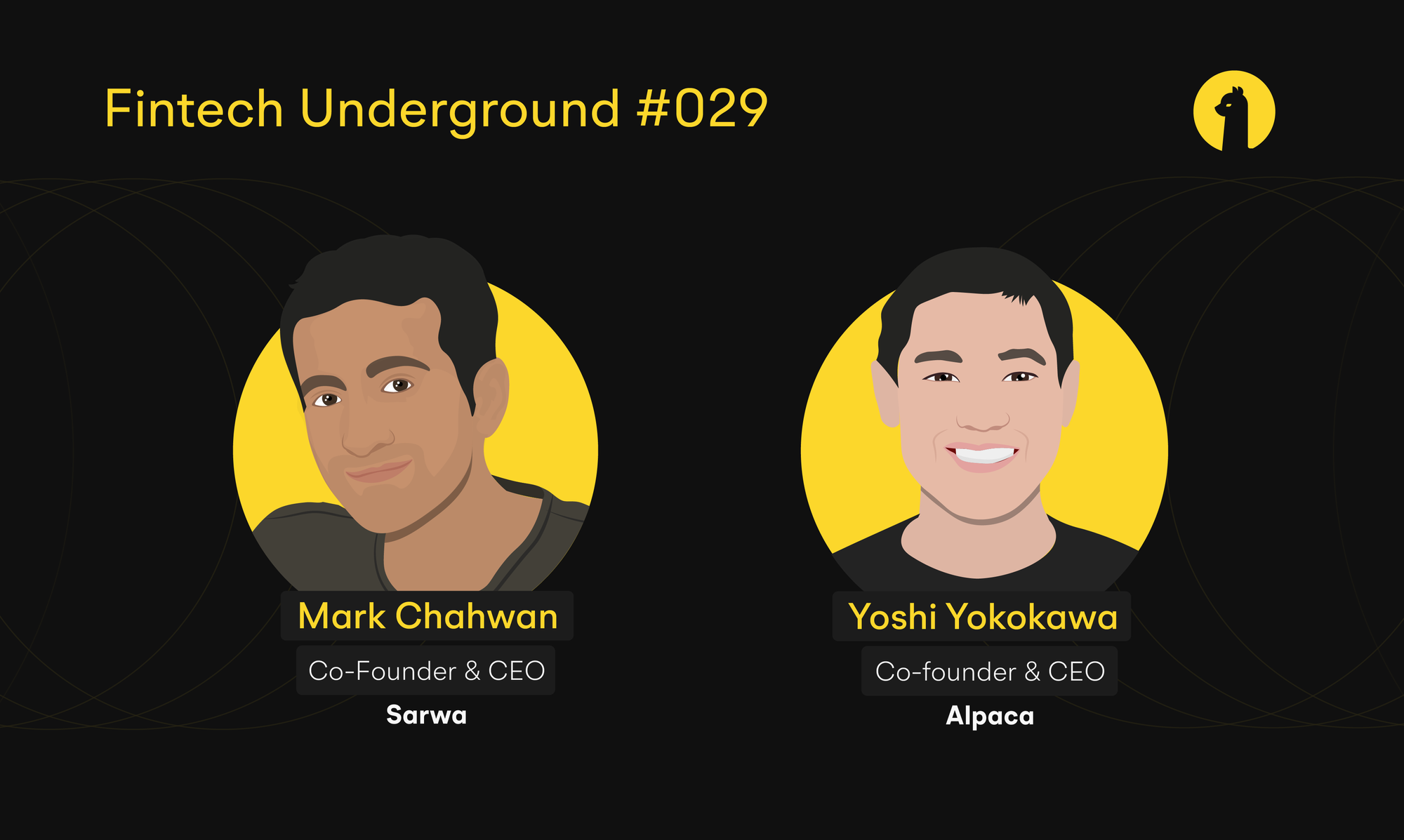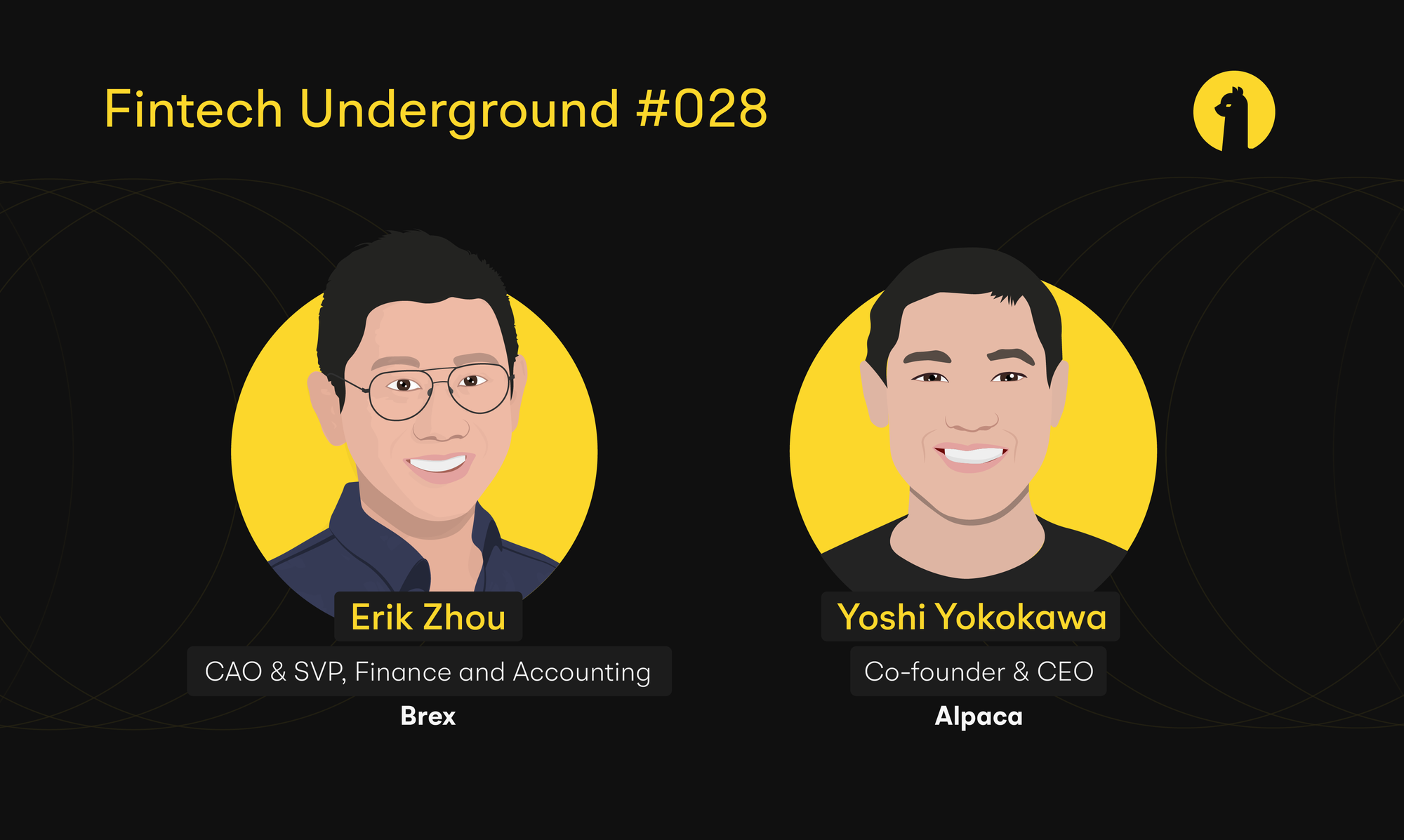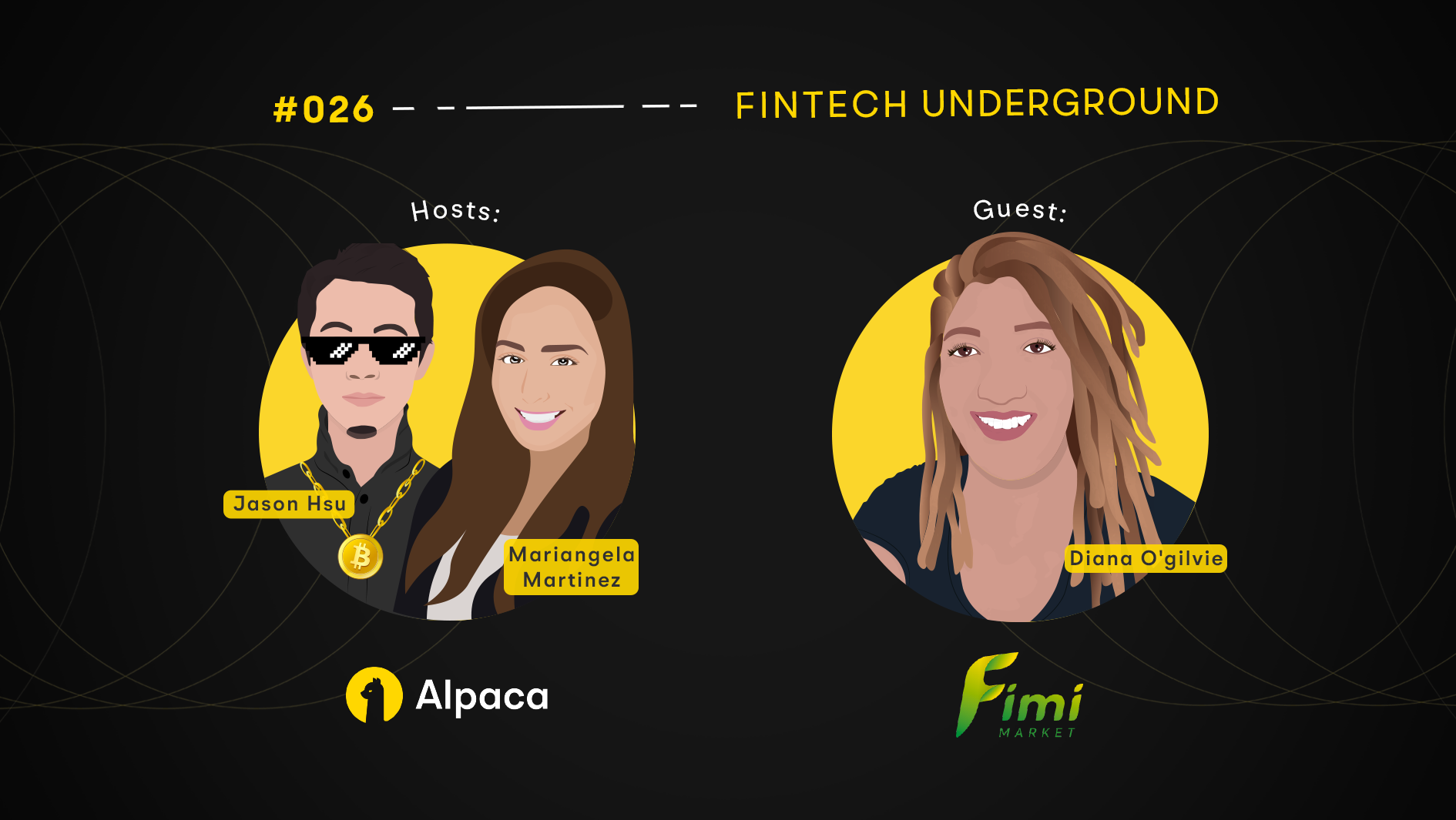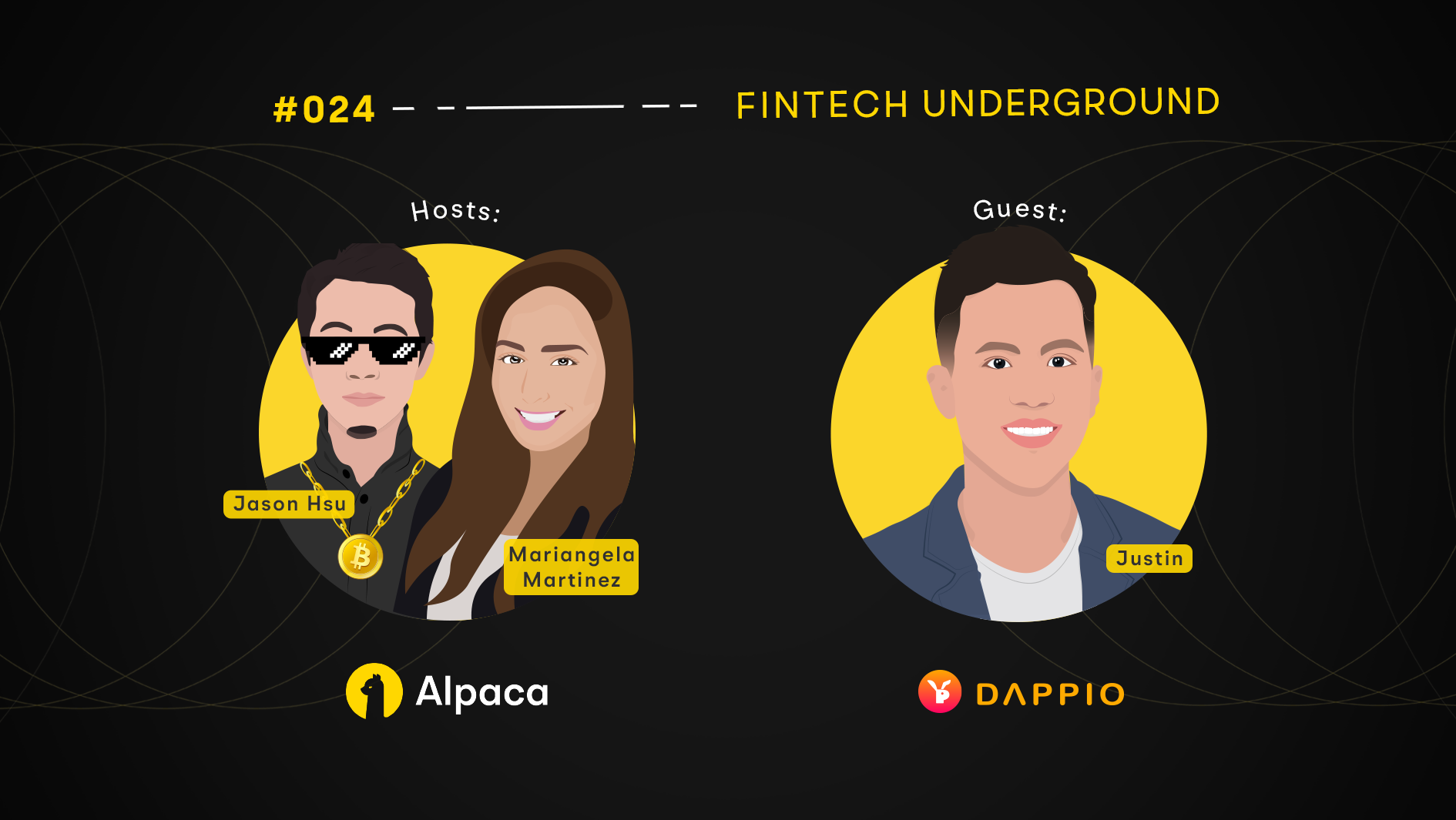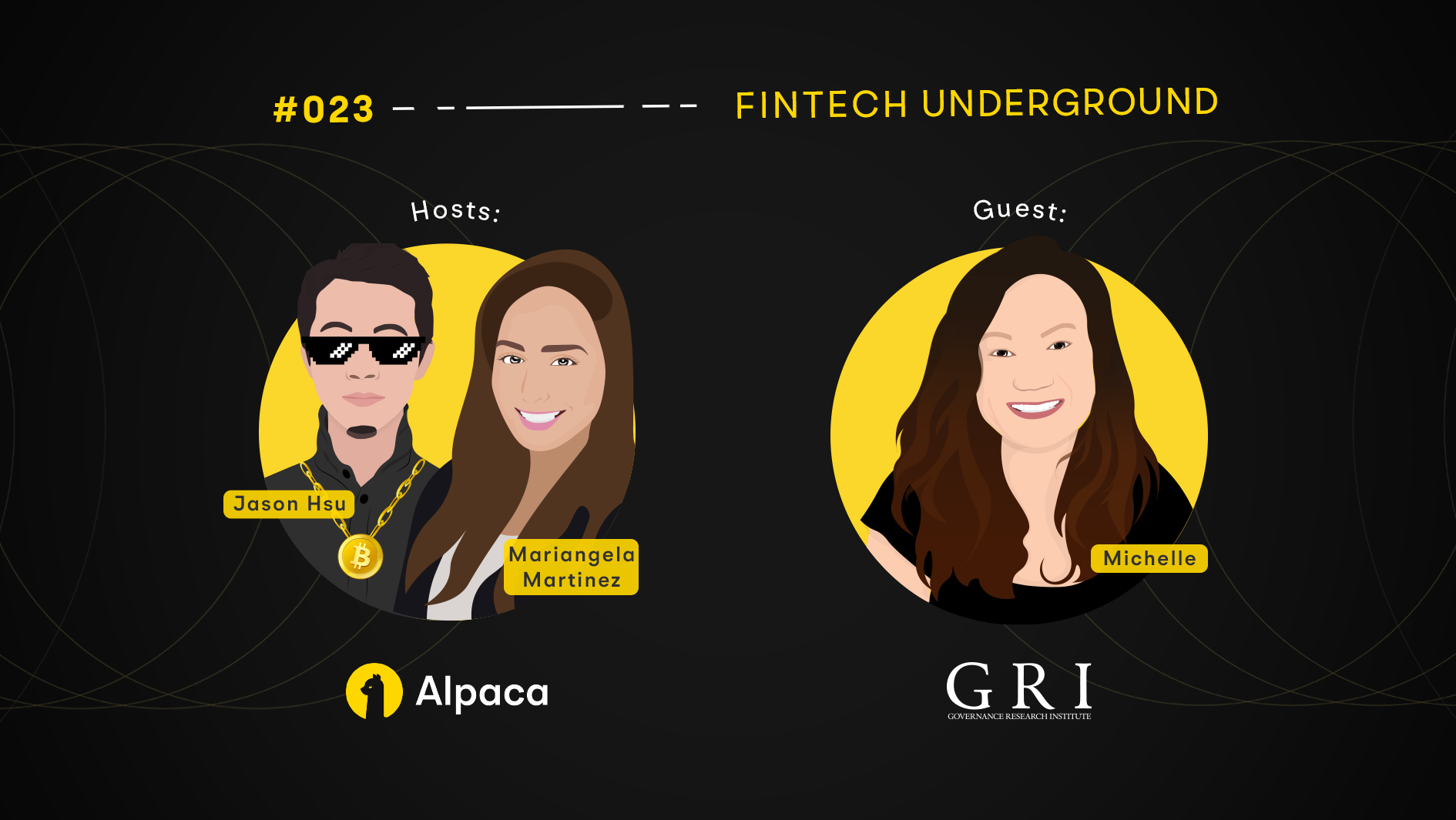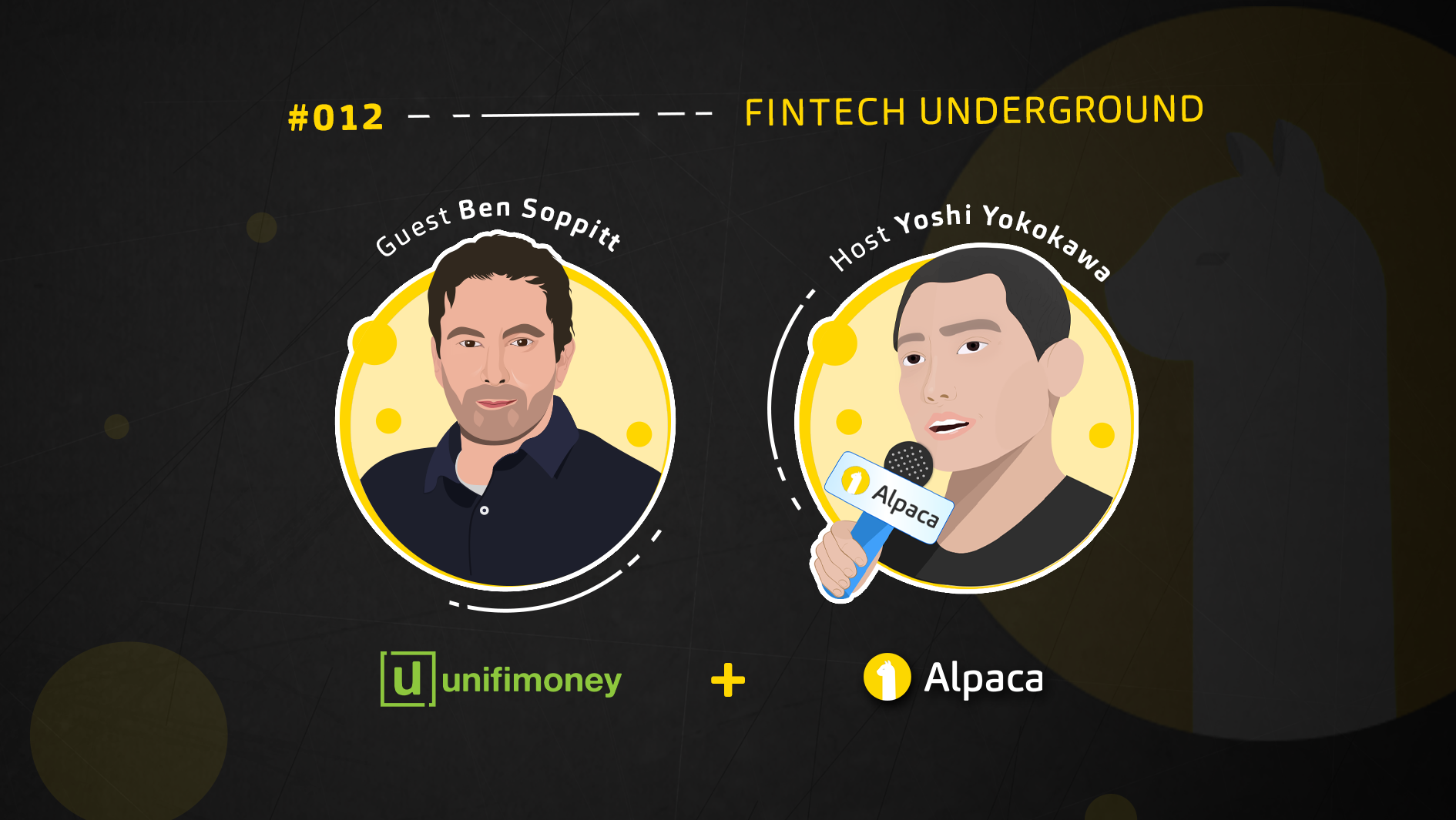
Any opinions expressed are opinions of the host and their guests. Alpaca Securities LLC does not recommend any specific investments or investment strategies.
Fintech Underground by Alpaca is a podcast devoted to all topics related to stock trading and APIs. From trading with algorithms or connecting apps or building out services, we aim to bring light to the different corners of Fintech.

TL;DR
On our twelfth episode of Fintech Underground by Alpaca, we interviewed Ben Soppitt. As the CEO of Unifimoney, a multi-asset investment and money management platform, Ben begins by discussing investor inertia and his motivation for starting Unifimoney, as well as the problems it aims to solve. From there, he discusses his favorite product feature and his background. Ending the episode with next steps and an upcoming launch for Unifimoney, this conversation isn't one to be missed.

Summary
By enabling people to unify spending, investing, and saving in one app, Unifimoney aims to provide a holistic consumer experience. Today we were fortunate to speak to Ben Soppitt, CEO of Unifimoney, who discusses what inspired him to found the company, modern barriers to investing in different asset classes, how Unifimoney aims to break down those barriers, the product roadmap, and more.
Find the full transcript below. To hear more CEO/Founders of the most interesting Fintech companies speak about their experience in the industry, check out our other episodes below.
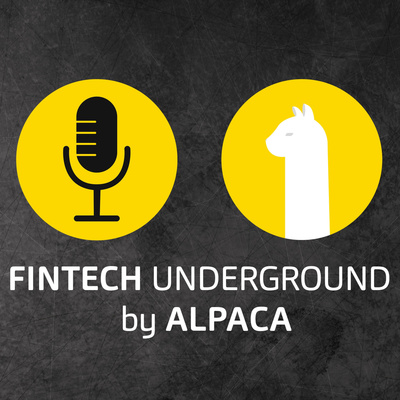
Full Transcript
Jason: [00:00:00] Welcome to FinTech Underground by Alpaca, a podcast devoted to stock trading API. From trading with algorithms to connecting apps, to building out services Alpaca is built for developers and traders. And with that being said, let's get started.
Hello, everybody. Welcome back to FinTech Underground by Alpaca. In each episode, we aim to explore a different area within FinTech. In today's episode, we have the honor to speak to Ben, the Founder and CEO of Unifimoney. Aiming to be an all-in-one financial platform, Unifimoney allows users the ability to open a checking account and investing account and soon to launch credit card. Not only that, but users wishing to invest can choose between a variety of assets, consisting of equities, precious metals, and cryptocurrencies. As Ben spent the vast majority of his career in FinTech, Yoshi, CEO and Co-founder of Alpaca dives deep into today's episode into Ben's background and experience starting Unifimoney. So let's get started.
Yoshi: [00:00:53] Hi Ben, nice meeting you and thank you very much for appearing on our podcast today, FinTech Underground. I know we have a lot of talk about very like rich, long experience in FinTech and running a FinTech company. So, Ben, do you want to talk a little bit about Unifimoney and what you do there?
Ben: [00:01:10] Hi Yoshi, great to be chatting with you, and thanks for the invite. I'm the Founder and CEO of Unifimoney. We are a multi-asset investment and money management app for mass affluent consumers. We are really leading the rebundling of financial services to bring simplicity and automation to customers, wealth management, allowing them to manage most, if not all of their money in a, in a single interface.
Yoshi: [00:01:33] That's super, because I can, I see that there are many innovations happening in this sector.
There's a lot of infrastructure from the broker-dealer to banking to credit card issuing, of course, with Alpaca being one of the infrastructures for the broker-dealer. So I'm super keen to dig in deep, but as you consolidate a lot of the financial services features, do you want to talk about what is the key, you know, the component that you are very much bullish about that you're currently offering from your app?
Ben: [00:02:03] I think history can teach us a lot about what consumers really want. And it's sometimes easy to get lost with every new FinTech typically focusing on one pretty discreet element of the financial market and generally the more exciting elements. But consumers’ needs haven't really changed around money. If you really reduce it down, we all have the same ambitions of money. We all want the same outcomes. We want to be financially independent, financially secure, very few of us like the effort of managing money. And there's an irony in the FinTech evolution, which is, whilst we may individually be optimizing for one or other discreet part of the financial ecosystem, in total, we've actually made it harder to manage your money overall.
30 years ago, it would be pretty unusual to have more than one banking relationship. And you would buy every product good, bad, or indifferent, from that bank. And at least it was simple. At least you knew where you stood and, you know, you knew who to talk to and which company you had to go to. It's now not uncommon to have 10 or 15 separate apps to manage your money.
And the job of synthesizing that is on the consumer. And it's that friction and that manual labor where a huge amount of value is lost because consumers don't want to do hard, difficult, complex manual things on a repetitive basis. Which is what managing money across 15 apps demands.
We think we're in a transition period. 30 years ago, you had one banking relationship. Today you have a plethora of financial FinTech apps and traditional apps. We think the future is not managing all your money on 10 or 15 apps. It's managing your money on one or two, and we're really helping to lead that rebundling of financial services.
The beauty and the great benefit though, is because in the old days, everything would be built by one bank and you can only be good at so many things. In the future, what we're doing, is we're finding best of breed providers and doing the bundling for the consumer so that they get a very holistic experience, whereas underneath we're doing the hard work to connect all of these separate disparate platforms.
Yoshi: [00:03:58] It's an interesting point, right? Because I think you have been in the industry for some time. How we think about it in a bird's eye view is that there's a repetitive going back and forth of bundling and unbundling.
And it kind of swings around. And when Robinhood came out early 2010, it was really like unbundling and let's focus on trading. And of course now they are bundling up with multiple services. And as you say that, it's now from unbundling to bundling for the FinTech app side.
I think what also makes it challenging though, is that bundling takes more effort and time because especially in financial services, we deal with the different regulations and infrastructure each with banking and crypto and securities and insurance and stuff like that.
So, how are you managing that as a startup - going into this era of unbundling to the bundling phase of the financial services apps? What is the challenge that you are seeing and how are you managing that?
Ben: [00:05:00] You've absolutely nailed it. The hardest thing here is trying to get different platforms, different companies, sitting in different regulated markets, highly regulated markets to work together.
And that's really what we've solved for. We have a 108-year old publicly listed bank in Kansas city that we're working with. And a six-month old fraud startup in New York city, crypto, precious metals, credit card. And we've got all of these companies to work together in a way that the consumer feels is a seamless experience, and it's not to do with technology at all.
The technology is actually fairly straight forward. It's just work. It's getting the head of compliance, head of risk, head of legal, at these different entities to agree. Not only to work with us, but to work with others, to create this holistic consumer experience. And that is what has taken a huge amount of effort.
And it's the opposite of what you think doing a startup would be about. You'd think it would be about creating that new technology and, you know, weird and wonderful algorithms and things that no one's ever thought of before.
But what we're solving for is really psychology and compliance is very subjective. Risk is very, very subjective. So it's not about reading a manual and simply interpreting it. It's about working with the people who own compliance, risk, and legal at these different entities and getting them to agree and align on a vision, number one, and a process, number two, that they are comfortable with.
And that is really what we've solved for and continue to solve for. And it's hard in things like crypto, because that carries a lot of emotional energy around it, particularly for traditional bankers and people in more traditional industries, but it's no different in every element of this, of the financial ecosystem.
And I think the only way we've been successful with that is that we have a team who have, on average, 20 to 30 years experience in financial services, all sorts of different parts of financial services.
We have people from banking, people from payments, people from the investment community, people from the regulator. And it's not just what the knowledge and experience we have; it's the contacts and the networks that we've been able to tap into to help us solve and navigate these discussions.
Yoshi: [00:07:16] That completely makes sense, dealing with a lot of compliance and how to present it in a way that everyone's happy about, because each of the regulations come with different levels of the compliance and the legal aspect of it while dealing with that. I feel like thinking about these finance apps, including trading to the challenger bank, to the payments apps, there's always this component of customer acquisition.
Customer acquisition is a very strong component of running the company. Of course, in addition to figuring out all the compliance and legal and creating the holistic experience, putting everything together. How are you fighting that? I feel there is a lot of competition in this market; why do you think there's a differentiation? Why do you think you can win in this market?
Ben: [00:08:05] The question we got asked when we started on this journey was, or the question a lot of investors would ask or pose is, they didn't think that it was possible to build a product like this. Particularly with the level of funding we were at and, you know, we've solved that question.
We're in the app store, we're working, it's a great product. We've delivered a very sophisticated, very broad platform in a relatively short amount of time with very limited resources. So we definitely solve that. Having a great product is necessary, but insufficient. And we were relatively early in our acquisition journey.
I think in financial services, there's a couple things. It's not just other fintechs. We're actually fighting 50 years of massive investment by the big brand banks in training customers to think a certain way. So if you look at the top 10, top 15 banks, they spend $15 billion a year in the U.S. on marketing.
For a commodity product. It's an extraordinary amount of money. Chase spends $2.6 billion annually. That's more than Apple spends globally on marketing. So you need to ask the question why, and it's because, you know, they're buying inertia, they're trying to convince consumers just through the weight of their power.
They're the ones you see on the recommendation sites. They're the ones that you hear of most often, and that helps create a fantastic inertia and a barrier around them because it's impossible to compete with a company with $2.6 billion through traditional means. So we can't fight with them through traditional means. So we have to fight with them through asymmetric warfare, asymmetric marketing warfare.
And we do that firstly, by having a differentiated product and offering value for money. You know, value for money is something that is surprisingly missing from most financial services brand definitions. And it's absolutely the opposite of what the big brand banks in particular deliver. So that's a starting point.
We've gone to market in a slightly alternative way. We branded ourselves as being the only bank in the world with an in-house comedy sketch team. And we created a whole series of satirical videos, really poking fun at the big brand banks and ourselves, as well as consumers, the frankly bizarre relationship we often have with big brand banks and how we give them so much value and they give us so little in return and yet we still stay with them.
And there's all sorts of really weird behavior and psychologies that we exhibit as consumers, as regards to big brand banks. And a lot of it is to do with the way they talk to us and have done for decades and trained us. For example, not to think of cash as an investable asset, we don't inherently look for the return on investment from our cash holdings.
We just go, well, it's safe. It's okay. Actually, it's dying. Inflation at three or four percent, it's killing your money slowly. Whilst the bank is selling those same funds, they're getting them from you interest free and they're selling them at 15-20%. And therein lies the 26 odd executive jets that Chase has.
That was one thing. But then, you know, having compelling content and being funny and, you know, having an alternative view of the world is all well and good, but you still need to be reaching the right consumers and you need to be communicating to them what it is you're doing differently. And for that, there's a very well-established online financial publishing community, everything from NerdWallet, Credit Karma, Seeking Alpha, and a long tail of other publishers who look at one or other elements of the financial services ecosystem.
And you need to be there. You need to play that game. We struggled a little bit because some of the publishers are like, well, are you a neobank or are you an investment app? Or do you have a credit card? And it's like, well, we're all three. And they said, well, we don't have a category for that. And I was like, absolutely right. We're a completely new category. Clearly, they're not going to create a new category just for us. So we've taken a lot of time and energy to work with the publishers and ensure that they understand that this is a little bit different, how we're different, what we're trying to achieve.
And that takes time. It takes time for them to write the reviews, takes time for them to understand, and it can be frustrating. You know, we're working with one publisher who did a fantastic article about how to invest in precious metals. We're the only consumer investment FinTech who has precious metal investing. And they didn't mention us.
Yoshi: [00:12:10] Actually lifted begin to that because like I was looking into the product and I see that precious metals, right, in addition to crypto and of course securities and stocks. So what was your decision making process to add precious metals when you were deciding on the product roadmap? What was your experience of why you wanted to add that?
Ben: [00:12:31] Yeah. Cause it's so different, you know, it's a 5,000 year old asset versus a 12 year-old asset. Every millennial knows about crypto and probably has some. Your average domestic gold investor is generally male and older. It's a very unusual market, but what we're solving for is access to alternative products of all sorts.
There were a couple of thought processes. The first is that from a roadmap perspective, we want to enable all forms of alternative assets, whether it's fine wine investing, sports collectibles, real estate, private companies, whatever it might be. Ultimately, we want to solve for access so that normal consumers, without having to go find some weird app, without having to go through another KYC and AML, without having to go through the pain of linking with Plaid, is able to, whenever they want, invest in these, in these assets and try it out. And precious metals was the second after crypto.
And another piece of that sort of decision process was that if you look at some key consumer groups, Bay Area tech workers, for example, over 70% are foreign. And a high proportion of those are coming from Asia. Investing in gold in Asia is a much bigger thing than investing in gold for domestic U.S. consumers. So we wanted to serve to that need and that audience. The part of the solving for access is if you try and buy gold online and you do a Google search, you very, very quickly end up with a pawnbroker in Las Vegas.
It's super sketchy. So there's a major barrier to people who may be interested in investing in gold or silver or platinum. It's pretty confusing to know where to go. So we wanted to solve that. We wanted to provide a curated experience. It's a very well-established, very mature asset class, which is almost unknown by most millennials.
So we wanted to solve that and give people a choice. I honestly don't care whether people invest in gold, silver, or platinum or not, but I want to give them the choice. I don't want asset classes to be denied or, or to have artificial barriers to certain consumer groups because the industry hasn't adapted to a digital environment.
Yoshi: [00:14:36] So with securities and banking, crypto and precious metals, what is the most impactful product so far that you've been witnessing from your product?
Ben: [00:14:48] Impact obviously has different dimensions one can look at. The product or the feature I should say that I think is most powerful is our auto invest feature. One of the things we wanted to solve for is the fact that most people don't invest. Less than 30% of millennials are invested in the sto, or invest on their own volition. And that drops even further below the age of 30.
And there's a massive, massive lost amount of value for consumers in that, by not investing. People who are able to, can afford to, should be but aren't, and why aren't they? Because it's a hassle, because it's complex, you've got to make up your mind. You've got to decide, you've got all of these decisions, each of which creates cognitive overload, and the natural reaction is do nothing. I'll just wait, I'll wait. It'll become clear over time, but it doesn't. So the average age for saving for retirement, starting to save for retirement in the US is 32. If we could reduce that to 25, trillions of dollars would be created in value over the working life of that entire generation.
So we know that awareness and education has failed in financial services. It's not that people are stupid or ill informed. The market is not helping them and not making it easy for them. The financial services industry has solved friction in payments. Why? Because it's in the economic incentive of merchants and credit card issuers to do so.
There's a reason why Amazon Go is so easy and Amazon one-click and Uber, because everybody knows that the easier something is, the more consumers will do with it. And that's how they get paid. Now, Chase doesn't get paid if your cash is held by Vanguard in a diversified ETF. So therefore, it's still as hard to save and invest as it was 20 years ago.
So what we're trying to do is make saving, investing as easy as paying for an Uber, making it completely automatic. So the feature that I'm most proud of and creates the most consumer angst initially, but then consumers love, is our auto invest feature. So we force our customers every month to put a minimum $25 in their robo investment account.
Now they can withdraw it at any time, they can cash it out. And we get a lot of customers who haven't necessarily really understood the value proposition of the product proposition. And they immediately contact us, and like, why are you forcing me to do this? I want to turn that off. We don't; part of the value proposition is we help you automatically and by default, model best practices and personal financial management. It's a nominal amount, $25. You can get it out at any time, but we made the decision for you. It's all Gherkin. And what we find is that after a couple of months, people are going, you know what I should've done this years ago. This is actually quite a good idea.
So then they start increasing the average deposits to $200, whatever they can afford. So that’s one of the ideas we had very, very early on. Dollar cost averaging shouldn't be a choice. It should be just something we all do naturally. And we have to help consumers to get them over, tip them over that barrier, that inertia to action and take the cognitive load of the decision off them.
So we did it. We get a lot of flack. But we also get a lot of love for it because consumers recognize we're actually basically forcing them to do something that they should have done years ago and is for the record.
Yoshi: [00:18:17] Got it. So, and so you continue to focus on the Bay Area and millennial generation, including a lot of people who came from Asia, using precious metals. So those are the people that you see who's currently using your product.
Ben: [00:18:33] Our core audience is more likely to be young professionals. So these are young doctors, young lawyers, people working in finance and tech. It just happens to be some of those industry segments have a very high proportion of foreign born users in them. So if you look at doctors, for example, 30 something percent of doctors are born abroad. In tech, you know, a huge proportion of people are born abroad.
So that's a consideration, but it wasn't a focus. The focus is the broad, the 15 million or so mass affluent millennials in the US, regardless of where they live or what they do. But when you look at the FinTech consumer market, the vast majority of those brands are focusing on, you know, quote unquote, underserved subprime, consumer segments.
It's, you know, the prepaid segment. Whereas I didn't want to fight with other FinTech brands for that audience. That there's over 19 neobanks in the U S, almost all of which are focused on subprime consumers. I'm looking at the massive profits of the big brand banks and which are not based on differentiated customer experience or value for money or innovation.
It's based on inertia. And that's the opportunity I saw, is the billions and billions of dollars of profitability that the big brand banks are making, frankly, by not providing particularly good product or service, that's the opportunity I wanted to go for. So that's why we focused on mass affluent consumers.
It naturally lends itself towards younger consumers because the older you get, the more habituated you get to complexity and the more complicated your life, and the harder it is to even think about moving. You know, the barrier to inertia is just massively, massively higher when you're 50, 60, whatever it might be, than when you're 20, 30.
But that doesn't mean we're excluding anyone. It just means we're more likely to be attractive to people who are digital natives who are still in the first half of their career.
Yoshi: [00:20:24] Let's turn the conversation a little bit to your background, because like I see that you worked for Samsung Pay, Fitbit, Visa and Accenture, Nokia, it's just a bit of a track record.
So you worked for many established, great companies. What was that trigger point that was like, “Okay, we need to start doing this”? What was the point that you decided to do this?
Ben: [00:20:47] I had one foray into being a founder when I was based in Indonesia and I created a company which was a, what we called mobile bank at the time, neobank in today's language.
But we got acquired by one of our bank sponsors and that's now today's largest digital bank in Indonesia. I then left Indonesia, went to Visa in Singapore, ran innovation across the region and moved to San Francisco to run another innovation project. But anyone who's worked in or with a big corporation knows that trying to work on innovation in a corporate environment is super, super hard.
Fitbit was not a startup when I joined. Fitbit was more than 10 years old when I joined, but we had a massive opportunity, I felt, to really bring together health and wellness with financial fitness, similar to what Paceline is doing today, for example. That could have been Fitbit. And we had bank partners who wanted to work with us like that.
But the leadership there frankly wasn't interested. They were focused on health and wellness and the health industry. They weren't interested in this idea of collaborating with financial services companies. So it's not something that only affects big global corporations. It also affects more companies, that sometimes your vision is not matched with the executives who ultimately control the resources and the direction.
I think you know, I'd been watching the Fintech, consumer fintech space. It felt so obvious to me that somebody should be launching a product that was focused on mass affluent consumers, because it's those consumers who've led the adoption of every digital market since the internet was created. And yet, somehow we were ignored as an industry.
We were ignoring mass affluent consumers, and we weren't, I felt, solving the real issues that they had, which are these very boring issues. What, what I call the sins of omission in personal finance, super boring. It's not the decisions you do make, or it's not bad decisions that you make that hurt you. It's the decisions you don't make.
It's leaving way too much money in a deposit account with a big brand bank. It's choosing a credit card because it's trying to signal some sort of affluence, um, metal card phenomenon, but not actually a particularly effective financial product in terms of its return on your span. And we're not dollar cost averaging because it's boring and complex and the payoff is 30 years time.
So that's what I wanted to solve for, because that has extraordinary power to raise people's long-term wealth creation journey, it's the get rich slowly philosophy. Everyone agrees with it, almost nobody does it because it's hard work. It's like having a New Year's resolution on January 1st. You've forgotten by January the 30th, or you've given it up because it's just too hard to keep on doing that manual labor.
So we wanted to solve that. We wanted to talk to people we felt were not given a choice. You bank with Chase, you bank with Bank of America. Do you bank with Wells? You get the same product. You just get a different brand. So we felt it was a real opportunity to do something different. I didn't see anyone else doing it.
And I did talk to a few companies. I talked to personal capital. I felt this was a really good extension of their platform, but for one reason or another, I couldn't convince them to go down that path. So I, in the end, thought, screw it. I'll do it.
Yoshi: [00:23:57] So, what was the specific catalyst that you received, you went through, while talking with those companies like personal capital and those guys?
Ben: [00:24:07] Yeah, I went through long processes with both companies and I was pitching them the vision, the product vision.
And then I actually went to a seminar at Brex and hearing Henrique, 22 years old, zero credit card experience, having made such an amazing success.
And that made me think I've got 30 years experience above and beyond him and a network. Maybe I can do half as good a job as Henrique in this space. And that's when I decided it's now or never. So yeah, that was, that was it.
Yoshi: [00:24:47] That's cheers to Henrique and Brex then.
Ben: [00:24:49] Yeah, absolutely. Still working on getting, you know, a fraction of their valuation, but hopefully we'll get there eventually. What they've done is incredible. They've taken on the most conservative market in credit cards. This is the last big financial services market that has almost zero innovation because it's so hard to launch a credit card as a small company. And the credit card industry is incredibly old-fashioned and conservative and you know, all credit to them. They just did it. They showed the path .
Yoshi: [00:25:17] Wow, I think that's a beautiful story. And I think that resonates with a lot of like professionals who are working in the big companies and pursuing their careers. But actually starting something new, I mean, that's always a really big shift, because I've experienced that coming working for the big corporations. So that's a beautiful story.
What is that next step for your product and where do you think you will be in five years, 10 years?
Ben: [00:25:45] There's two things I'm really excited about at the moment. One is we're launching our credit card in August. So we created a collaboration and this is largely to do with my former Visa contacts, but we created a collaboration quite some time ago with Rails bank and worked together to bring this credit card as a service model to the U S, which is part of that sort of ambition around bringing FinTech innovation to credit cards. And all credit to the rails bank team for seeing that opportunity and for diving in and making it happen.
There'll be a whole stream of super interesting innovative products around credit. So that's something I'm really looking forward to. It's a $4 trillion industry with literally no competition.A handful of companies dominate that market. And it's our job, I think, as startups to do better by the market and to bring better propositions. Yeah.
The other really interesting opportunity, which I'm super excited about, is working with regional and community banks. The big problem with consumer acquisition is that you're fighting inertia because the thought of moving banks is almost too much to bear. All the thought of signing up to another app or doing something else, you know, it's work.
Whereas if you're actually working with a bank, inertia is on your side and you have approximately 10,000 regional and community banks with millions and millions and millions of very happy customers. And the smaller banks are not offering the similar wealth management services that the big banks are doing.
And we had a number of banks reach out to us and ask whether they could essentially work with us and partner to offer digital wealth management services to their customer bases. I think it's a very natural and complementary extension to work with those institutions to provide them not just with parity for the big brand banks on digital wealth management, but actually something that the big brand banks are not gonna be able to compete with for decades.
It's going to be a very long day in hell before Chase is gonna offer crypto, precious metals and collectibles investing. And yet that's something that a small community or regional bank could potentially deliver within a very short period of time working with us.
So those are the two things I'm really excited about at the moment.
Our credit card is designed to help you save and invest, not one that is designed to encourage you to spend more. So working on your behalf, and in your interests rather than the banks'.
And then working with regional and community banks, who I genuinely believe are working on behalf of their consumer's best interests, which is something I don't think anybody could claim the big brand banks are doing, and really helping extend their customers' access to digital financial services in all their flavors.
Investing got fun over the last 10 or 15 years. It went from being pretty boring to being pretty exciting. You can invest in a copy of the declaration of independence on Rally road and stuff's inherently much more interesting than the way it was done 10 years ago.
And I think they're predicting now that consumer retail investing will top 30% of all deal flow this year, which, and 10 years ago it was 10%. So this would have been this extraordinary increase in engagement and involvement by investors or consumers in their own wealth management. And we want to be a part, as you are, in accelerating that.
And if we can do that, working with well-established regional and community banks with strong customer bases and strong brands. Yeah. That's great. We'll do it. We're not purist in any way, we just want to help as many people as quickly as possible.
Yoshi: [00:29:21] That sounds great. I mean, you know a bunch of the network and the industry professionals in payments, so that a lot of banks are like, it's a really exciting time. Those players do need innovation again.
Thank you very much for coming to our FinTech underground and thank you very much for sharing your insights and experience to all of us. Thank you very much, Ben.
Ben: [00:29:42] Thanks, Yoshi, it's been a pleasure.
Jason: [00:29:43] I also wanted to thank all of our listeners for joining us today on this episode of FinTech Underground by Alpaca. As always, check on all of our past episodes on all major streaming platforms podcasts can be found. Thank you.
If you liked this episode of Fintech Underground by Alpaca, be sure to check out our other episodes below.

You can also follow Alpaca and our weekly updates on LinkedIn and Twitter.
Brokerage services are provided by Alpaca Securities LLC ("Alpaca"), member FINRA/SIPC, a wholly-owned subsidiary of AlpacaDB, Inc. Technology and services are offered by AlpacaDB, Inc.


